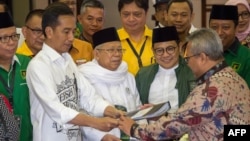As Indonesian President Joko “Jokowi” Widodo prepares to compete in the nation’s 2019 national election, he faces a mass social media campaign calling itself #2019GantiPresiden (change the president in 2019), criticizing the incumbent for being inadequately sympathetic to Islamic interests and the rising prices of household goods.
After several heated clashes with Jokowi supporters, several subsequent #2019GantiPresiden rallies have been disallowed by police, sparking the accusation that the president is employing authoritarian tactics reminiscent of the country’s former dictator Suharto to suppress critics.
Mardani Ali Sera, the parliamentarian for the Prosperous Justice Party (PKS) who began the #2019GantiPresiden hashtag, told VOA he didn’t have a plan to start the campaign. After going on the prominent TV show Indonesian Lawyers Club in February, however, he said “almost all of the panelists were praising Jokowi. I thought this isn’t healthy for democracy. Because of that, I took the opportunity to say God willing in 2019 the government will change.”
Freedom of speech vs. keeping the peace
As the world’s third largest democracy, Indonesia has long juggled the challenges of ensuring freedom of speech while also preserving interethnic and religious harmony. Many of the comments attached to the #2019GantiPresiden hashtag are incendiary, including falsely accusing Jokowi of secretly being a Christian or kowtowing to the Chinese Communist Party. In response, the president has maintained that there are limits to Indonesian democracy.
“This country is a democracy. Yes, you are free to gather, to argue. But remember there are limits, there are rules,” he said earlier this month, as quoted by Tempo.
“We have never at all disturbed our friends who support #Jokowi2Periode (two periods for Jokowi). It is everybody’s right [to support Jokowi],” said Mardani of PKS.
Neno Warisman, a prominent anti-Jokowi activist, arrived in the Sumatran city of Pekanbaru in late August to attend a #2019GantiPresiden event.
She said she was met by pro-Jokowi counterprotesters who threw things at her car, and the police sent her back to Jakarta on a plane. Referring to Neno’s removal, Deputy Speaker of the House Fahri Hamzah accused Jokowi of displaying an “authoritarian mentality.”
“It’s quite a stretch to claim that the government [is using] authoritarian measures to silence those people,” said Rudi Sukandar, a senior researcher at The Habibie Center, a Jakarta-based thinktank focused on the promotion of democracy and human rights. “Those people actually have already had their own voice, and they have voiced their opinions openly.”
Rahayu Saraswati, a member of the Indonesian parliament for the opposition Gerindra Party, said in a statement provided to VOA that “reactions toward #2019GantiPresiden have been interesting, but despite what some are trying to paint it as, it begun as and still very much is a social movement.”
Democratic backsliding?
When elected in 2014, Jokowi appeared on the cover of TIME and was touted as “the new face of Indonesian democracy.” Unlike his predecessors, Jokowi was not from the political elite or an ex-general, but rather a furniture salesman turned mayor hailing from the central Javanese city of Solo.
Nevertheless, many observers have perceived setbacks for democracy during his tenure. The blasphemy conviction of former Jakarta governor Basuki “Ahok” Tjahaja Purnama in May 2017, who was once Jokowi’s own deputy, is seen as emblematic of the growing influence of right-wing religious groups and the shrinking space for free speech.
Conversely, however, the government’s outlawing of Hizbut Tahrir Indonesia (HTI), a fundamentalist Islamist group that promotes the replacement of Indonesia’s relatively secular democracy with a transnational caliphate, albeit by nonviolent means, is also seen by many as a step backwards for democracy.
Indeed until 2017, the Indonesian Communist Party was the only so-called “mass organization” officially banned by the government. Jokowi’s detractors began to accuse him of acting like a dictator.
The denial of #2019GantiPresiden activists the right to protest has been framed in a similar manner, justified by authorities on the basis that its campaigners have allegedly spread hate speech, misinformation and pose a threat to public order.
For Tom Pepinsky, an associate professor in the Southeast Asia Program at Cornell University, the #2019GantiPresiden movement is “picking up on” the authoritarian legacy of Suharto’s New Order regime in contemporary democratic politics.
“The Indonesian political system retains a bunch of laws that allow for the regulation of political speech should a president choose to do so,” he said.
“I don’t have a problem with the hashtag itself … this is after all, freedom of speech,” said Rudi of the Habibie Center. “The thing that might not be acceptable for me is if they’re using issues of ethnicity … and some other things that might incite people’s hatred towards Jokowi.”
According to Rahayu of Gerindra, however, the movement is comparable to anti-Trump protests in the United States.
“The American people in those protests demand change in government leadership,” she said. “It is a rally call to all those who feel the same, that there should and will be a change of leadership in Indonesia for the betterment of the people and for the sake of the country’s future.”




